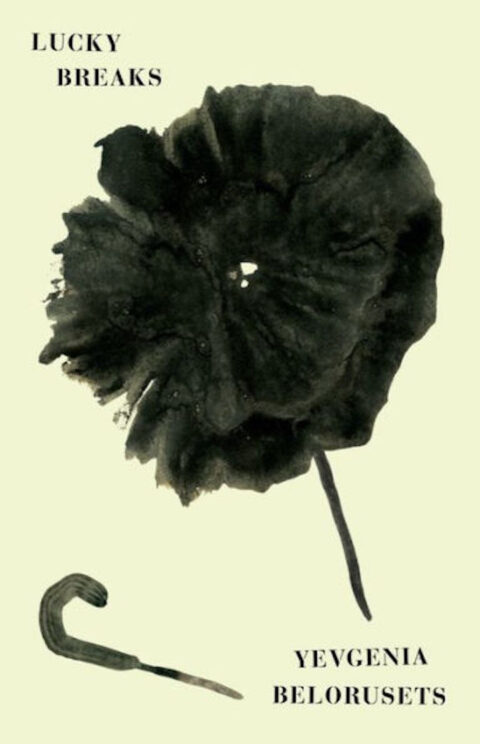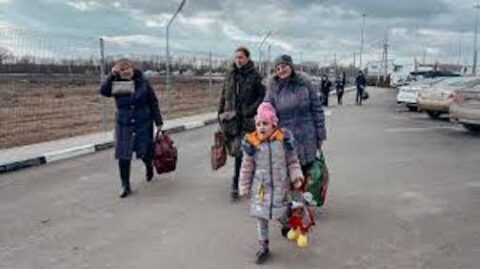Although the tales told in Yevgenia Belorusets’ Lucky Breaks are concerned with the everyday lives of Ukrainian women –displaced, disrupted, and forgotten due to the Russian war in the eastern Donbas region since 2014 — it is the wider war of 2022 that haunts the book and brings a prescient perspective to reading it now. These jagged, tragicomic, sometimes fantastical stories tread through a murky zone between reportage and art, inspired in part by the author’s travels across Donbas to document and explore its working-class heritage and give voice to people at the margins of Ukrainian society. The author raises pointed questions about the commingling of fact with fiction and the nature of truth, an approach that complements a conflict that has been waged by the Russians through both propaganda and military might.
 Belorusets’ debut story collection is framed by the eye of a visual artist and activist. A celebrated photographer, she is wary of untruths that swarm beyond the lens. In the first of two prefaces, she posits that all photographs are “someone’s fiction, a theatrical contrivance merely based on someone’s life.” Photographs from two of her series about the industrial mining culture of Donbas inform the text like visual non-sequiturs: the uncaptioned images are presented tangentially to the text they accompany. The photos are additional story lines, but because we tend to accept photos as evidentiary, their inclusion in Lucky Breaks is one of the ways Belorusets creates tension between the reader’s expectations of verisimilitude and her assertion that these are works of fiction. In her view, both image and text “escape the author’s control” and ultimately result in the “rejection of any constraints of certainty.” Memories themselves are the artist’s medium, with the resulting works as much constructed by the audience as by the creator. No wonder then that her narrator claims that her subjects’ experiences and identities have been absorbed into her own.
Belorusets’ debut story collection is framed by the eye of a visual artist and activist. A celebrated photographer, she is wary of untruths that swarm beyond the lens. In the first of two prefaces, she posits that all photographs are “someone’s fiction, a theatrical contrivance merely based on someone’s life.” Photographs from two of her series about the industrial mining culture of Donbas inform the text like visual non-sequiturs: the uncaptioned images are presented tangentially to the text they accompany. The photos are additional story lines, but because we tend to accept photos as evidentiary, their inclusion in Lucky Breaks is one of the ways Belorusets creates tension between the reader’s expectations of verisimilitude and her assertion that these are works of fiction. In her view, both image and text “escape the author’s control” and ultimately result in the “rejection of any constraints of certainty.” Memories themselves are the artist’s medium, with the resulting works as much constructed by the audience as by the creator. No wonder then that her narrator claims that her subjects’ experiences and identities have been absorbed into her own.
That narrator’s shifting identity is wielded to unsettle the reader’s sense of the amorphous line between truth and fiction. The confusion begins immediately with that first preface, clearly in the author’s voice, explaining her photographs in the book and her intention to let the reader decide if her “documentation … disrupts the language of fiction.” This segues into the second preface in which the author seems to dissolve into the narrator, focusing on an interview with a journalist from Donbas (Andrea, the only recurring character in the collection) who is more concerned with formulating her questions than with the narrator’s answers. Dissatisfied with her interviewee’s responses, Andrea tells the author-narrator that she plans to move in with her to “feel the fiber of your assurance, your bluster” — to truly understand her motivations. The reader might surmise that Andrea is the author’s journalistic, more authentic Donbas alter ego, the faux-ethnographer who will observe her countrywomen in the pages to come. In this preface and throughout the book, our narrator will often step outside the text in short bursts of meta-narrative — or perhaps it is the author momentarily reclaiming the helm.
Like the photos shorn of context, the stories in Lucky Breaks obscure as much as illuminate. Some stories end abruptly with a character’s disappearance, or are cut off by the unreliable, sometimes snappish narrator. Each story is shaped by the politics or details of the war, sometimes referenced but most often occurring outside the frame. The tales generally fall into two categories — the first in observed moments of action, thought, or decision. In “A Woman Finds a Job,” the narrator notes wryly that the woman in question no longer answers her calls after answering a job ad for a governmental administrator that requires “a model’s good looks” and to accompany her boss on business trips. “Transformations,” one of the anecdotes with absurdist turns that channel Gogol or Kharms, tells of a Sloviansk native in Kyiv who has the magical power to change everyday objects, such as a fork into a wooden Easter egg. Yet perhaps the most shocking story describes “Elena” who suddenly tosses her phone into a fountain, thus abandoning her dependent, controlling mother. In a society with strong intergenerational bonds, this seems unimaginable, and yet pushed to extremes the women of Lucky Breaks do what they must to preserve some part of themselves.
The stories share themes of alienation from home and family and the perceived expendability of women, whether in places of refuge from war or trapped behind by a shadowy conflict that confounds one’s understanding of who is fighting and why. Trauma haunts them, like the woman who upbraids her umbrella like a child as she attempts unsuccessfully to abandon it all over Kyiv, or another with a singular problem: she is terminally healthy, unable to catch a simple cold, but turning to prayer, instinctively gives God a false name:
“‘Ha-ha, Martha! You’re no Martha!’ (A voice suddenly rang out above her head.) This digression might veer beyond the bounds of my study, but I fail to understand what this woman could have expected if she even lied about her own name during prayer? Could it be that someone would stir so much as a finger over such trifles, over such petty and stupid, if you allow me to say so, requests? What a naive piece of reasoning! It’s high time you know that grace may descend on people as insignificant as her. Because, after a brief pause, she heard the same voice again. It flew down straight from the sky, sharp and clear at the same time. “Be of good comfort,” it said. “You shall no longer have health, Malvina. For your prayer has been answered, and you shall be struck down by illness, and that illness shall be the common cold.”
Her prayers answered, bemusedly, by the Almighty, “insignificant” Malvina/Martha rejoices in someone, anyone who listened to her, and lies down in anticipation of her deliverance by the life-affirming pleasures of her impending mild illness. The narrator’s ironic commentary is used throughout these tales to represent how outsiders might view these marginalized people.
 Most of the women in Lucky Breaks toil in meaningless jobs, living alone, often precariously in Kyiv after fleeing from the war in Donbas. They are no one and everyone, the detritus of a conflict rendering them invisible, suspicious to their fellow Ukrainians, unneeded in the western and central parts of the country where a visitor might not even notice that a war engulfs portions of the easternmost region. The people of Donbas have often asserted that their compatriots ignore their voices. Belorusets seeks to remedy that deficit through her focus on the small, the trivial, the impassioned observation of the beliefs and actions of the women who stayed, fled, and live in between. (Although it must be noted, as one Ukrainian reviewer of this book has done, that dialogue requires both sides to listen.) Her prose is uncomplicated, tonally ironic at times but ultimately empathic. Whether related through reportage or imagined scenes, their struggles to establish a new life in unwelcoming surroundings sound authentic.
Most of the women in Lucky Breaks toil in meaningless jobs, living alone, often precariously in Kyiv after fleeing from the war in Donbas. They are no one and everyone, the detritus of a conflict rendering them invisible, suspicious to their fellow Ukrainians, unneeded in the western and central parts of the country where a visitor might not even notice that a war engulfs portions of the easternmost region. The people of Donbas have often asserted that their compatriots ignore their voices. Belorusets seeks to remedy that deficit through her focus on the small, the trivial, the impassioned observation of the beliefs and actions of the women who stayed, fled, and live in between. (Although it must be noted, as one Ukrainian reviewer of this book has done, that dialogue requires both sides to listen.) Her prose is uncomplicated, tonally ironic at times but ultimately empathic. Whether related through reportage or imagined scenes, their struggles to establish a new life in unwelcoming surroundings sound authentic.
The wider war that began in February 2022 has thrown into sharper relief the contours of the conflict that shapes Lucky Breaks, the English translation of which was published just a week after the bombing and incursion began. It is with this newfound familiarity with events in Ukraine that the reader might now experience some dissonance with Belorusets’ intentions. That earlier conflict has often been cast by careless media outlets and Russian propaganda in terms of “pro-Russian separatists” who wanted their voices to be heard by the Kyiv “regime” after the Maidan Revolution in 2014 that deposed the corrupt president whose seat of power was in the Donbas. In truth, the war was instigated and led by Russian covert and regular troops. So today it is jarring when stories like “The Florist” speak about “partisans.” Despite Belorusets’ philosophy that truth is malleable and ultimately unknowable, the facts behind the war are now plain to see. The plight of women internally displaced by the conflict of 2014 points to the millions of women and children who have fled Ukraine.
 One also wonders if Ukrainian writers like Belorusets, who work in the Russian language, will continue to find a readership in Ukraine. There has been more nonsense written about the supposed “language issue” than any other aspect of the conflict between Russia and Ukraine. Russia used the notion of “protecting” Russian-speakers in Donbas to justify its occupation there. In truth, anyone who has traveled or lived in Ukraine will know of the easygoing bilingualism across the country. However, once the war ends, the use of the Russian language in Ukraine may be curtailed. Many of my friends there, even those from Donbas, have already switched to Ukrainian personally and professionally. They no longer allow their children to watch videos with Russian voices or to read books in that language.
One also wonders if Ukrainian writers like Belorusets, who work in the Russian language, will continue to find a readership in Ukraine. There has been more nonsense written about the supposed “language issue” than any other aspect of the conflict between Russia and Ukraine. Russia used the notion of “protecting” Russian-speakers in Donbas to justify its occupation there. In truth, anyone who has traveled or lived in Ukraine will know of the easygoing bilingualism across the country. However, once the war ends, the use of the Russian language in Ukraine may be curtailed. Many of my friends there, even those from Donbas, have already switched to Ukrainian personally and professionally. They no longer allow their children to watch videos with Russian voices or to read books in that language.
The reader can almost sense a shadow book being written by an invisible hand while reading this one. The full-scale war has launched millions of accounts of bravery, survival, tragedy, and displacement that will be distilled into countless future literary works. One of those may well turn out to be Belorusets. During the first few months of the invasion, she published a gripping online diary of her experience in Kyiv. In his perceptive “Translator’s Afterword,” Eugene Ostashevsky (inexplicably uncredited on the front cover) notes the author’s answer in a 2018 interview when questioned about the ethics of mixing real and imagined stories: “Readers have to constantly sense what is happening. Any document is partly a lie.” Still, as a document of a people and a time that is vital to understand the ongoing war, Belorusets’ unsettling, provocatively humane tales make for rewarding reading, whether one accepts at face value the author’s assertion that they are entirely fictional or wishes to engage more deeply with her ideas on the fungibility of fiction and non-fiction.
[Published by New Directions on March 1, 2022, 112 pages, $14.95, paperback]